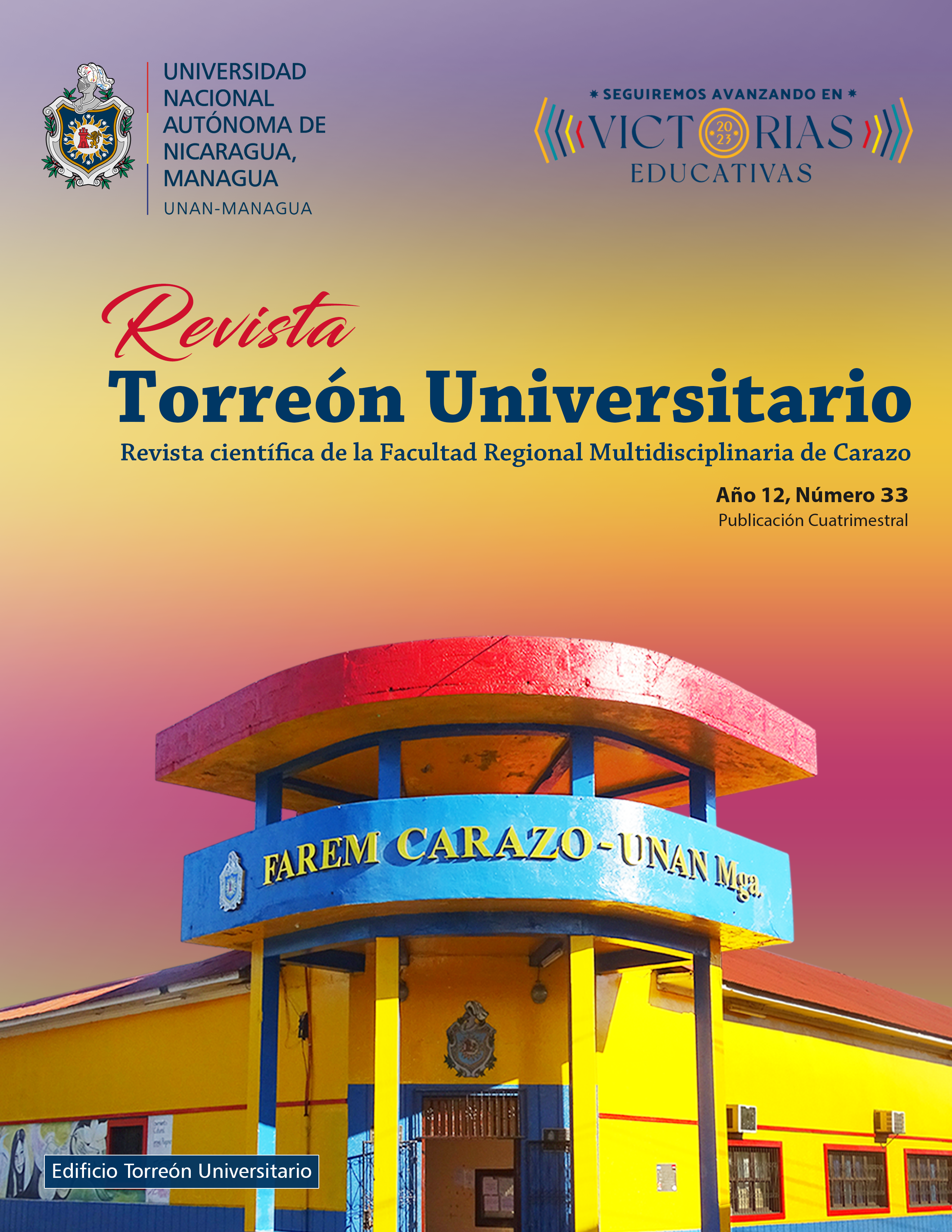Didáctica de la competencia oral desde la perspectiva del modelo de aprendizaje por esquemas
DOI:
https://doi.org/10.5377/rtu.v12i33.15883Palabras clave:
aprendizaje, discurso, esquema, metodología, modeloResumen
La comunicación oral representa para cualquier ser humano un modelo esencial de interacción sociocultural en contextos comunicativos diversos. Por tanto, este articulo tiene como propósito presentar algunas consideraciones sobre la didáctica de la oralidad, específicamente el discurso oral formal en la mesa redonda, desde la perspectiva del Modelo de Aprendizaje por Esquemas. El estudio utiliza el enfoque cualitativo para la estructuración y análisis de los instrumentos de investigación. Asimismo, según su tipología está clasificada como Investigación Acción Participativa (IAP). En relación a los resultados, se cimentan a partir de las tres fases de análisis de la información (diagnóstica, formativa, consolidación) las que indican los avances conceptuales y procedimentales de las situaciones de aprendizaje (discurso, mesa redonda y conectores lógicos). Con respecto a la discusión, se precisan el progreso por etapas y se resaltan las limitaciones, destacando las relacionadas al trabajo colaborativo, la construcción de los materiales y la integración de las TIC. Por otra parte, las conclusiones manifiestan la funcionalidad del modelo adoptado debido a la inserción léxica de 187 conectores al discurso y el cumplimiento de la metodología de la mesa redonda en un 88%. Asimismo, se recalca la necesidad de continuar la validación del enfoque en didáctica de la lengua y literatura considerando la diversidad de tipologías discursivas, las macrohabilidades del lenguaje y la educación especial.
Descargas
442
VISOR 0
HTML 58
PDF (English) 95
HTML (English) 15
Citas
Arias, S y Hernández, S. (2017). Estrategia Didáctica para la Enseñanza del Discurso en el Área de Lengua Castellana del Grado Once de la Institución Educativa Municipal Liceo Central de Nariño [ Tesis de licenciatura, Universidad de Santo Tomás] Repositorio Institucionalhttps://repository.usta.edu.co/bitstream/handle/11634/9505/AriasSandra2017.pdf?sequence=1
Balcazar, F. (2003). Investigación acción participativa (IAP): Aspectos conceptuales y dificultades de implementación. Fundamentación en Humanidades, 4 (8), 59-77. https://www.redalyc.org/pdf/184/18400804.pdf
Brenes, R. (2011). Desarrollo de la expresión oral y la comprensión auditiva como parte de las competencias comunicativas y desde el enfoque comunicativo, en estudiantes de educación diversificada de colegios públicos de Cartago en el 2009 [ Tesis de doctorado, Universidad Nacional Estatal a Distancia] Repositorio Institucional https://repositorio.uned.ac.cr/reuned/handle/120809/1004
Escobar, A. (2016). Esquemas de aprendizaje de la gramática [ Tesis doctoral, Universidad Nacional Autónoma de Nicaragua, Managua].
Granda, O. (2010). Estrategias didácticas para el trabajo del discurso oral en el aula: Octavo año de educación general básica [ Tesis de licenciatura, Universidad de Cuenca] Repositorio Institucional https://dspace.ucuenca.edu.ec/bitstream/123456789/2016/1/tle189.pdf
Hernández, S, Fernández, C y Baptista, P. (2014). Metodología de la investigación (6 ed.) Editorial Interamericana. http://observatorio.epacartagena.gov.co/wp-content/uploads/2017/08/metodologia-de-la-investigacion-sexta-edicion.compressed.pdf
O'shanahan, J. (1996). Enseñanza del lenguaje oral y las teorías implícitas del profesorado. Soportes Audiovisuales e informáticos [ Tesis doctoral, Universidad de la Laguna] Repositorio Institucional https://riull.ull.es/xmlui/bitstream/handle/915/10093/cs27.pdf?sequence=1&isAllowed=y
Quiles, M. (2015). El discurso oral en las aulas de educación primaria. Revista lenguaje
y textos, 9 (12), 77-87. https://ruc.udc.es/dspace/bitstream/handle/2183/8237/LYT_23_2005_art_7.pdf?sequence=1&isAllowed=y
Descargas
Publicado
Cómo citar
Número
Sección
Licencia
Derechos de autor 2023 Universidad Nacional Autónoma de Nicaragua, Managua

Esta obra está bajo una licencia internacional Creative Commons Atribución-NoComercial-SinDerivadas 4.0.
Los autores que publican en esta revista están de acuerdo con los siguientes términos.
- El autor o los autores de los artículos, ensayos o investigaciones conceden a la Universidad Nacional Autónoma de Nicaragua, Managua (UNAN-Managua) los derechos de edición (copyright) del trabajo enviado, por consiguiente la Universidad cuenta con el derecho exclusivo para publicar el artículo durante el periodo completo de los derechos de autor.
- Estos derechos de autor/ autores autorizan a la Revista Torreón Universitario y a la Universidad editar y divulgar/publicar el artículo en dicha Revista, incluyendo reproducción impresa y electrónica, el almacenamiento, recuperación y cualquier otro tipo de publicación, y fuentes de información secundaria como servicios de resúmenes y bases de datos, así mismo la facultan a proteger el artículo contra el uso no autorizado para su difusión por medios impresos o electrónicos (PDF, HTML, EPUB, XML u otros).
Licencia para el uso del contenido
La revista hace uso de la Licencia Creative Commons Atribución-NoComercial-SinDerivar 4.0 Internacional.
Bajo esta declaración:

Este revista está sujeta a una licencia de Creative Commons Reconocimiento-NoComercial-SinObraDerivada 4.0 Internacional. Puede ser copiada, distribuida y transmitida públicamente siempre y cuando se cite al autor y la fuente (Revista Torreón Universitario), no debe modificarse ni utilizarse con ningún fin comercial. La licencia completa se puede consultar en http://creativecommons.org/licenses/by-nc-nd/4.0/.



